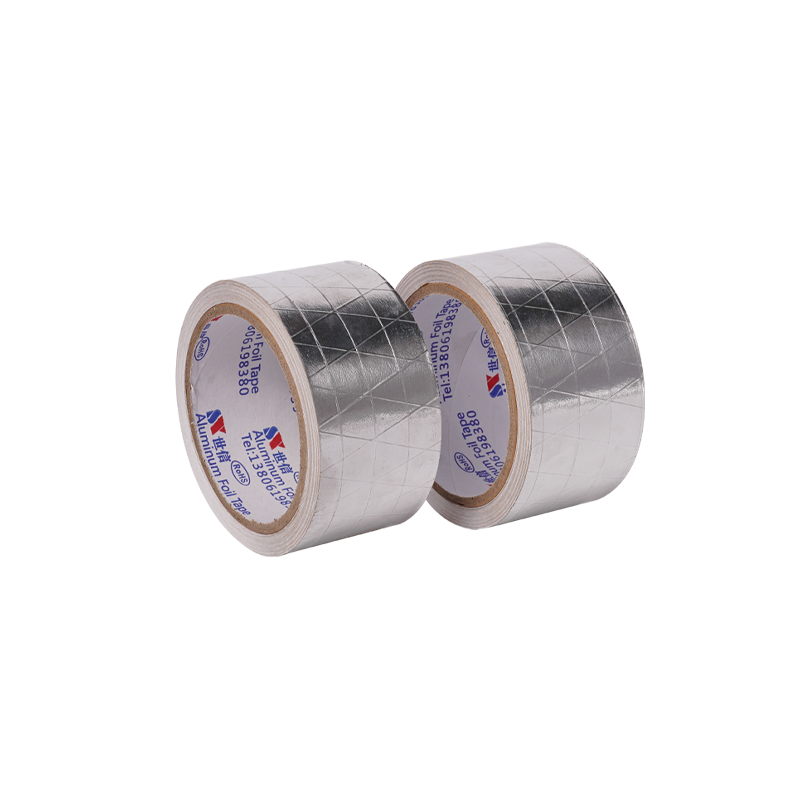FSK reinforced aluminum foil tape is highly favored due to its unique structure, as it not only possesses the excellent properties of standard aluminum foil tape but also offers significantly improved tensile strength. The core advantage of this tape lies in its reinforcing layer, typically a glass fiber mesh or polyester fiber, which is sandwiched between the aluminum foil surface and a strong acrylic pressure-sensitive adhesive. This sandwich structure allows it to maintain exceptional stability in the face of external stress, vibration, or temperature changes, making it resistant to tearing or deformation. Consequently, it provides a longer-lasting sealing effect, effectively preventing the leakage of air, moisture, and heat, thereby playing a crucial role in various applications that demand high-strength adhesion and long-term durability.
The application range of this tape extends far beyond a single field, demonstrating remarkable versatility. In HVAC systems, it is commonly used to seal ductwork joints, ensuring that hot and cold airflow does not escape and significantly improving energy efficiency. Its excellent insulation properties prevent external heat loss from the pipes, effectively reducing the system's energy consumption. In the construction industry, it is widely applied for waterproofing and moisture-proofing roofs, walls, and pipes, especially at pipe penetrations and joints, where it can form a strong protective barrier. Furthermore, in fields such as automotive manufacturing, electronics, and household appliance repair, FSK reinforced aluminum foil tape has also become an indispensable material due to its outstanding weather resistance and adhesive strength.

To fully leverage the performance of FSK reinforced aluminum foil tape, correct installation is crucial. First, the surface must be clean, dry, and free of oil, as any dust or impurities can affect the tape's adhesion. Next, when applying the tape, one should avoid creating air bubbles or wrinkles; a scraper or roller tool can be used to smoothly press it from one end to the other to ensure full contact between the tape and the surface. Especially at joints, it is recommended to have a sufficient overlap, typically 2 to 3 centimeters, to form a firm and long-lasting seal. Finally, after application, apply even pressure again with a tool to activate the tape's pressure-sensitive adhesive, allowing it to achieve its optimal bonding strength.
Choosing the appropriate specifications for FSK reinforced aluminum foil tape requires a comprehensive consideration of the application environment and specific requirements. First is the tape's width, which typically comes in various specifications such as 50 mm, 75 mm, and 100 mm. For wider pipes or joints, selecting a wider tape can reduce splicing, improving both installation efficiency and sealing effectiveness. Next is the tape's thickness, which is directly related to its durability and tear resistance. In environments with high temperatures, high humidity, or significant mechanical stress, a thicker tape should be chosen. Additionally, the tape's temperature resistance range and weatherability should be considered to ensure it can perform normally in extreme conditions. By carefully evaluating these parameters, you can select the tape product that best meets the needs of your specific project.
Although FSK reinforced aluminum foil tape is highly durable on its own, proper maintenance and protection can further extend its service life. After installation, one should regularly inspect the edges and joints of the tape to ensure there is no lifting or damage. If any damage is found, it should be repaired promptly to prevent the problem from escalating. Furthermore, the tape should be kept from prolonged exposure to strong chemical solvents or friction from sharp objects, as these factors can lead to damage to the tape's surface or adhesive layer. In areas where physical impact is likely, you can consider adding a protective covering over the tape to provide an additional physical barrier. Through these simple maintenance measures, you can ensure that the tape's sealing and insulation performance remain at their best for a long time to come.